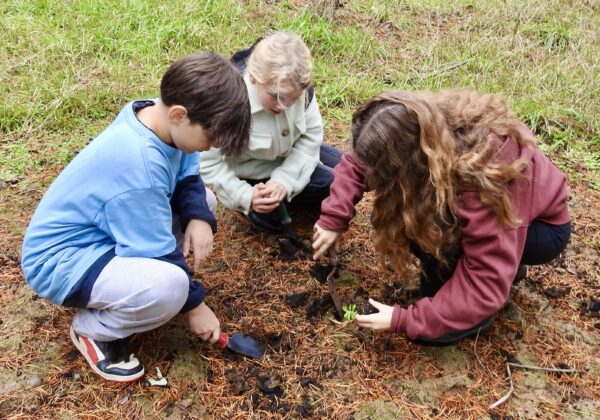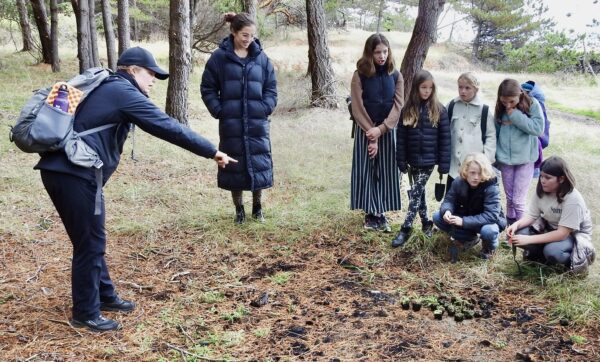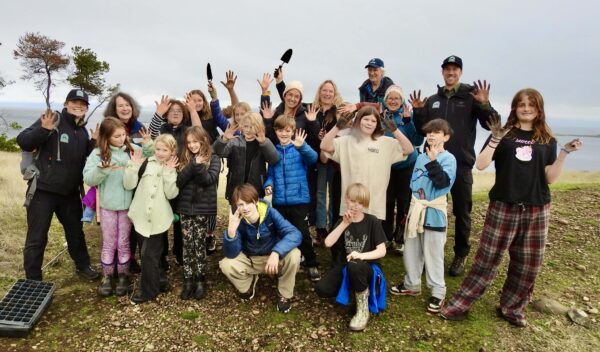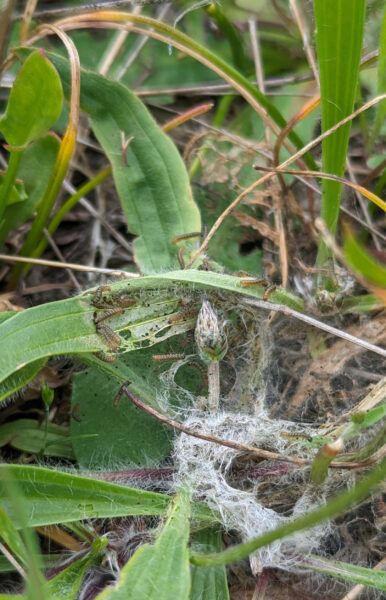Helliwell habitat work continues
By Chris Junck, Taylor’s Checkerspot Butterfly Recovery Project

Hornby Island Community School students, their teacher Miranda Guzzo, parents, Natural History Centre stewards, and BC Parks staff worked quickly to plant areas where brush piles were burned last winter. Photo by Bill Hamilton.
Hornby Island Community School students from Miranda Guzzo’s classes made a significant contribution to the habitat restoration project in Helliwell Provincial Park this fall. On October 22, they planted yarrow, woolly sunflower, California brome, Junegrass and blue wildrye in bare patches of soil in the park after piles of dead branches and other forest fire fuels were burned last winter. The native plants were grown for the restoration project by Hornby Island Natural History Centre stewards.

BC Parks conservation specialist Stephanie Govier provided information about the coastal bluff restoration work and planting instructions. Photo by Bill Hamilton.
Neil Wilson, one of the stewards, said, “thanks everyone for your work in setting up and pulling off our eighth successful Hornby Island Community School, Natural History Centre, BC Parks, and Taylor’s Checkerspot Butterfly Recovery Project collaboration. We managed to plant 592 native plant plugs for the Taylor’s checkerspots!”
“Wow – what an awesome effort,” said Hornby Island Community School Principal Lisa Malones.

The group had dirty hands and big smiles after planting nearly 600 native plant seedling plugs. Photo by Bill Hamilton.
The long-term project is enhancing Helliwell’s Garry Oak and coastal bluff meadow habitat and reducing forest fire fuels. More dead branches and selective trees will be removed and burned this winter, followed by native plant seeding and planting.
The project aims to improve habitat for endangered Taylor’s checkerspot butterflies and other at-risk species. The Taylor’s Checkerspot Butterfly Recovery Project Team is cautiously optimistic that the work is paying off. Taylor’s checkerspots that were raised at the Greater Vancouver Zoo by Wildlife Preservation Canada staff and released in Helliwell last year reproduced. Their larvae overwintered and emerged in the spring. This is an encouraging sign that the butterflies may re-establish a population in the park.

In June, Pascale Archibald located 88 webs in Helliwell containing hundreds of Taylor’s checkerspot larvae. It’s proof that the butterflies are producing offspring, which is a hopeful sign that the reintroduction project is succeeding. Photo by Pascale Archibald.
The project team would like to thank the Cowichan Tribes, Halalt, Homalco, K’ómoks, Lake Cowichan, Lyackson, Penelakut, Qualicum, Snaw’Naw’As, Stz’uminus, Tla’amin, We Wai Kai, and We Wai Kum First Nations for allowing us to restore ecosystems in their traditional territories. Several local volunteers from Conservancy Hornby Island, the Hornby Island Natural History Centre, the Hornby Island Provincial Parks Committee, and others also contributed to the success of this project.
The recovery project has benefited from funding and in-kind contributions from the BC Parks Licence Plate Program, the Habitat Conservation Trust Foundation, the Environment Canada Habitat Stewardship Fund, and the B.C. Ministry of Environment and Climate Change Strategy (Ecosystems Branch), Canada Pollinator Partnership and others.
The Taylor’s Checkerspot Butterfly Recovery Project Team includes biological consultants and representatives from the B.C. Ministry of Water, Land and Resource Stewardship, B.C. Ministry of Environment and Parks, BC Parks, Denman Conservancy Association, Garry Oak Ecosystems Recovery Team, Greater Vancouver Zoo, Mosaic Forest Management, Wildlife Preservation Canada, and others.